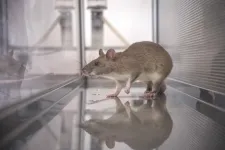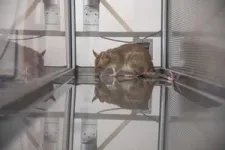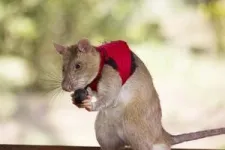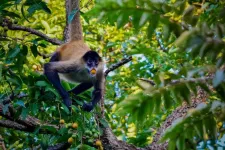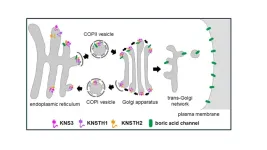(Press-News.org) In the past, African giant pouched rats have learned to detect explosives and the tuberculosis-causing pathogen. Now, a team of researchers have trained these rats to pick up the scent of pangolin scales, elephant ivory, rhino horn, and African blackwood. These animals and plants are listed as threatened and at high danger of extinction.
“Our study shows that we can train African giant pouched rats to detect illegally trafficked wildlife, even when it has been concealed among other substances,” said Dr Isabelle Szott, a researcher at the Okeanos Foundation, and first co-author of the study published in Frontiers in Conservation Science.
“The rats also continued to detect the wildlife targets after not encountering that species for a long period,” added first co-author Dr Kate Webb, an assistant professor at Duke University.
The research for the present study was conducted at APOPO, a Tanzania-based, non-profit organization that provides a low-tech, cost-efficient solutions to pressing humanitarian challenges.
Ratting out wildlife trafficking
The rats – Kirsty, Marty, Attenborough, Irwin, Betty, Teddy, Ivory, Ebony, Desmond, Thoreau, and Fossey; some of them named after conservationists and advocates against wildlife trafficking – underwent several training stages. During indication training, the rats learned to hold their noses for several seconds in a hole in which the target scent was placed. When they correctly performed this ‘nose poke’ they were rewarded with flavored rodent pellets.
In the next step, the rats were introduced to non-target odors. These included electric cables, coffee beans, and washing powder – objects that are frequently used to mask the scent of wildlife in real-life trafficking operations. “During the discrimination stage, rats learn to only signal the odors of the wildlife targets, while ignoring non-targets,” Szott said.
The rats were also trained to remember smells. At the end of their retention training, they were re-introduced to scents they’d not encountered for five and eight months, respectively. Despite months of non-exposure, the rats showed perfect retention scores, suggesting that their cognitive retention performance resembles that of dogs.
By the end of the training, eight rats were able to identify four commonly smuggled wildlife species among 146 non-target substances.
Rats in action
“Existing screening tools are expensive and time intensive and there is an urgent need to increase cargo screening. APOPO's rats are cost-efficient scent detection tools. They can easily access tight spaces like cargo in packed shipping containers or be lifted up high to screen the ventilation systems of sealed containers,” Szott explained.
The next step, the scientists said, is to develop ways for the rats to work within ports through which smuggled wildlife is trafficked. For this purpose, the rats will be outfitted with custom-made vests. With their front paws, they will be able to pull a small ball attached at the chest of their vest, which emits a beeping sound. This way rats will be able to alert their handlers when they detect a target. “The vests are a great example of developing hardware that could be useful across different settings and tasks, including at a shipping port to detect smuggled wildlife,” said Webb.
This proof-of-principle study demonstrates that rats can successfully identify trafficked wildlife. This does not mean that it comes without limitations, the researchers said. For example, the study was conducted in a controlled environment, which is not reflective of the settings in which wildlife is commonly trafficked or screened by scent-detection animals. To deploy rats for this task, new methods need to be developed, the researchers pointed out.
“Wildlife smuggling is often conducted by individuals engaged in other illegal activities, including human, drug, and arms trafficking. Therefore, deploying rats to combat wildlife trafficking may assist with the global fight against networks that exploit humans and nature,” concluded Webb.
END
Giant rats could soon fight illegal wildlife trade by sniffing out elephant tusk and rhino horn
Researchers trained African giant pouched rats to detect illegally trafficked wildlife species and remember targets for several months
2024-10-30
ELSE PRESS RELEASES FROM THIS DATE:
Spin current observations from organic semiconductor side
2024-10-30
Electrons spin even without an electric charge and this motion in condensed matter constitutes spin current, which is attracting a great deal of attention for next-generation technology such as memory devices. An Osaka Metropolitan University-led research group has been able to gain further insight into this important topic in the field of spintronics.
To investigate the characteristics of spin currents, OMU Graduate School of Science Professor Katsuichi Kanemoto’s group designed a multilayer device consisting of a ferromagnetic layer and an organic semiconductor ...
Alcohol consumption among non-human animals may not be as rare as previously thought, say ecologists
2024-10-30
Anecdotes abound of wildlife behaving “drunk” after eating fermented fruits, but despite this, nonhuman consumption of ethanol has been assumed to be rare and accidental. Ecologists challenge this assumption in a review publishing October 30 in the Cell Press journal Trends in Ecology & Evolution. They argue that since ethanol is naturally present in nearly every ecosystem, it is likely consumed on a regular basis by most fruit- and nectar-eating animals.
“We're moving away from this anthropocentric view that ethanol is just something ...
Survey: Dangerous gap in knowledge about pancreatic cancer among adults under age 50
2024-10-30
While pancreatic cancer rates are rising in people under age 50, a new survey conducted by The Ohio State University Comprehensive Cancer Center – Arthur G. James Cancer Hospital and Richard J. Solove Research Institute (OSUCCC – James) shows most people continue to believe that pancreatic disease affects only the elderly – and that there is nothing they can do to reduce their risk.
For this survey, respondents were asked about risk factors for pancreatic cancer. More than half (53%) of adults under age 50 said they would not recognize the early signs or symptoms of the disease, and more than one third (37%) believe there is ...
Women entering menopause later in life at greater risk for asthma
2024-10-30
CLEVELAND, Ohio (Oct. 30, 2024)—Many studies suggest that an earlier age at menopause is more detrimental to a woman’s health, leading to an increased risk for adverse health conditions such as heart disease, diabetes, osteoporosis, and depression, among others. However, a new study is linking a later age at natural menopause with a greater risk for asthma. Results of the study are published online today in Menopause, the journal of The Menopause Society.
Asthma is a common, chronic disease affecting more than 300 million people worldwide. The prevalence of asthma ...
Sinuses prevented prehistoric croc relatives from deep diving
2024-10-30
EMBARGOED: NOT FOR RELEASE UNTIL 00.05 (UK TIME) WEDNESDAY 30 OCTOBER 2024
An international team of paleobiologists have found that the sinuses of ocean dwelling relatives of modern-day crocodiles prevented them from evolving into deep divers like whales and dolphins.
A new paper published today [30 October] in Royal Society Open Science suggests that thalattosuchians, which lived at the time of the dinosaurs, were stopped from exploring the deep due to their large snout sinuses.
Whales and dolphins (cetaceans) ...
Spirited away: Key protein aids transport within plant cells
2024-10-30
Botanists have come to understand the channels and transporters involved in the uptake and transport of nutrients, yet how are they positioned where they need to be?
For example, plants need boron, which is taken into the cells by molecules known as the boric acid channel. But how do the proteins that form the channel make it to the plasma membrane?
A research group led by Professor Junpei Takano of Osaka Metropolitan University’s Graduate School of Agriculture identified a mutant line of Arabidopsis thaliana in which the boric acid channels are not properly transported to the plasma membrane. The cause was a deficiency in the protein KAONASHI3 (KNS3); the name ...
Britain’s brass bands older than we thought and invented by soldiers from the Napoleonic Wars, new study reveals
2024-10-30
University of Cambridge media release
Britain’s brass bands older than we thought and invented by soldiers from the Napoleonic Wars, new study reveals
UNDER STRICT EMBARGO UNTIL 00:01 AM (UK TIME) ON WEDNESDAY 30TH OCTOBER 2024
Military musicians returning from the Napoleonic wars established Britain’s first brass bands earlier than previously thought, new research reveals. The study undermines the idea that brass bands were a civilian and exclusively northern creation.
It is widely believed that brass bands originated with coal miners and other industrial communities ...
The Lancet: Health threats of climate change reach record-breaking levels, as experts call for trillions of dollars spent on fossil fuels to be redirected towards protecting people’s health, lives and
2024-10-30
The Lancet: Health threats of climate change reach record-breaking levels, as experts call for trillions of dollars spent on fossil fuels to be redirected towards protecting people’s health, lives and livelihoods
New global findings in the 8th annual indicator report of the Lancet Countdown on Health and Climate Change reveal that people in every country face record-breaking threats to health and survival from the rapidly changing climate, with 10 of 15 indicators tracking health threats reaching ...
‘Weekend warrior’ exercise pattern may equal more frequent sessions for lowering cognitive decline risk
2024-10-29
Just one or two sessions of physical activity at the weekend—a pattern of exercise dubbed ‘weekend warrior’---may be just as likely to lower the risk of cognitive decline, which can often precede dementia, as more frequent sessions, concludes research published online in the British Journal of Sports Medicine.
And it may be more convenient and achievable for busy people as well, suggest the researchers.
It’s important to identify potentially modifiable risk factors for dementia because a 5-year delay in onset might halve its prevalence, they say, adding that nearly all the evidence to date comes from studies ...
Physical activity of any intensity linked to lower risk of death after dementia diagnosis
2024-10-29
Physical activity of any intensity after a diagnosis of dementia is associated with around a 30% lower risk of death, finds research published online in the British Journal of Sports Medicine.
The findings prompt the researchers to conclude that those affected should be encouraged to keep up or start an exercise routine, especially as average life expectancy after a diagnosis of dementia may be only around 4-5 years.
Previously published research has linked physical activity with a lower risk of death in people with the disease, but these studies have focused on a single point in time. So it’s not clear if changes in the amount or intensity of physical ...
LAST 30 PRESS RELEASES:
Hairdressers could be a secret weapon in tackling climate change, new research finds
Genetic risk for mental illness is far less disorder-specific than clinicians have assumed, massive Swedish study reveals
A therapeutic target that would curb the spread of coronaviruses has been identified
Modern twist on wildfire management methods found also to have a bonus feature that protects water supplies
AI enables defect-aware prediction of metal 3D-printed part quality
Miniscule fossil discovery reveals fresh clues into the evolution of the earliest-known relative of all primates
World Water Day 2026: Applied Microbiology International to hold Gender Equality and Water webinar
The unprecedented transformation in energy: The Third Energy Revolution toward carbon neutrality
Building on the far side: AI analysis suggests sturdier foundation for future lunar bases
Far-field superresolution imaging via k-space superoscillation
10 Years, 70% shift: Wastewater upgrades quietly transform river microbiomes
Why does chronic back pain make everyday sounds feel harsher? Brain imaging study points to a treatable cause
Video messaging effectiveness depends on quality of streaming experience, research shows
Introducing the “bloom” cycle, or why plants are not stupid
The Lancet Oncology: Breast cancer remains the most common cancer among women worldwide, with annual cases expected to reach over 3.5 million by 2050
Improve education and transitional support for autistic people to prevent death by suicide, say experts
GLP-1 drugs like Ozempic could cut risk of major heart complications after heart attack, study finds
Study finds Earth may have twice as many vertebrate species as previously thought
NYU Langone orthopedic surgeons present latest clinical findings and research at AAOS 2026
New journal highlights how artificial intelligence can help solve global environmental crises
Study identifies three diverging global AI pathways shaping the future of technology and governance
Machine learning advances non targeted detection of environmental pollutants
ACP advises all adults 75 or older get a protein subunit RSV vaccine
New study finds earliest evidence of big land predators hunting plant-eaters
Newer groundwater associated with higher risk of Parkinson’s disease
New study identifies growth hormone receptor as possible target to improve lung cancer treatment
Routine helps children adjust to school, but harsh parenting may undo benefits
IEEE honors Pitt’s Fang Peng with medal in power engineering
SwRI and the NPSS Consortium release new version of NPSS® software with improved functionality
Study identifies molecular cause of taste loss after COVID
[Press-News.org] Giant rats could soon fight illegal wildlife trade by sniffing out elephant tusk and rhino hornResearchers trained African giant pouched rats to detect illegally trafficked wildlife species and remember targets for several months
